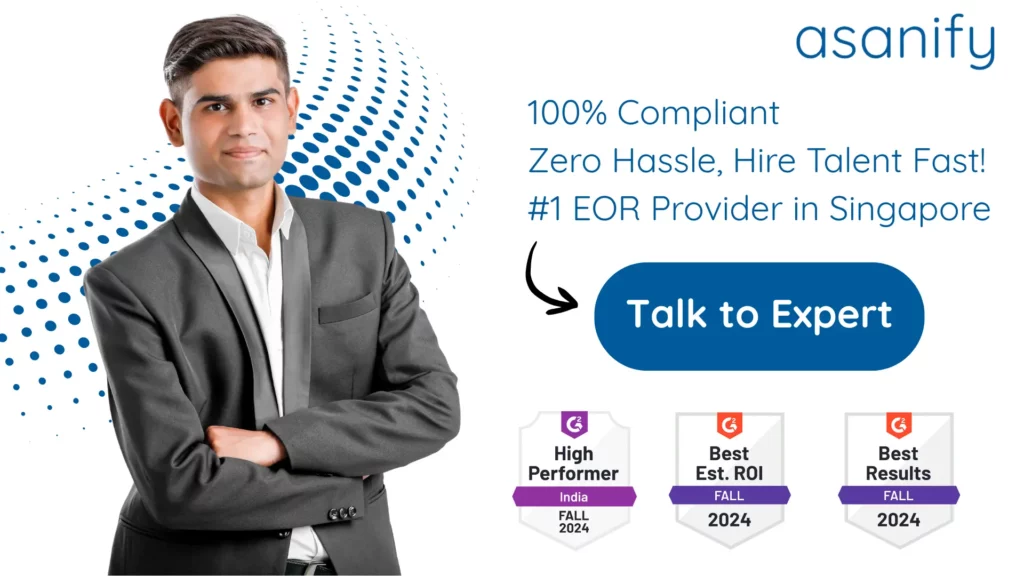Learn the steps, compliance rules, salary structures, and total costs to successfully hire remote team in Singapore. This guide covers the country’s employment landscape, in-demand skills, labor laws, and the benefits of using an Employer of Record (EOR) to streamline hiring.
Singapore has long been recognized as a premier hub for international business and remote talent in Asia. Its highly skilled, multilingual workforce, robust infrastructure, and favorable business environment make it an excellent destination for global companies hiring remote teams in 2025. Combined with strong government support for digital transformation and innovation, Singapore offers unparalleled opportunities for building high-performing distributed teams.
Table of Contents
- Overview of Singapore for Remote Hiring
- Leading Industries Driving Employment in Singapore
- Industry Landscape Snapshot
- Cost of Living for Remote Employees in Singapore
- In-Demand Skills in Singapore (2025)
- Key Legal Considerations for Hiring in Singapore
- Payroll and Tax Compliance in Singapore
- Using an EOR for Payroll and Compliance
- Salary Ranges for Remote Roles in Singapore (2025)
- Steps to Hire a Remote Team in Singapore
- Total Cost of Hiring Remote Employees in Singapore
- How Can Asanify Simplify Hiring in Singapore?
- Conclusion
- FAQs
Overview of Singapore for Remote Hiring
Singapore is a leading global business hub, strategically located in Southeast Asia with excellent connectivity to global markets. Its workforce is highly educated, fluent in English and multiple Asian languages, and skilled in technology, finance, and professional services. The country offers several advantages for remote hiring, including reliable high-speed internet and strong IT infrastructure, a favorable business environment with minimal corruption and clear labor laws, and access to a highly experienced pool of professionals across tech, finance, and logistics.
Additionally, Singapore’s multicultural and multilingual workforce makes it ideal for supporting both regional and global operations. Since the pandemic, remote work adoption has grown significantly, with many companies embracing flexible and hybrid work models to leverage Singapore’s top-tier talent efficiently.
Leading Industries Driving Employment in Singapore
Singapore’s top industries fueling remote employment in 2025 include:
- Information Technology & Digital Services: Software development, cloud engineering, and cybersecurity are in high demand.
- Financial Services & Fintech: Singapore is Asia’s financial hub, attracting roles in accounting, compliance, and financial analysis.
- Logistics & Supply Chain: Its world-class port and logistics ecosystem create opportunities for remote supply chain specialists.
- Biotechnology & Life Sciences: R&D and medical technology jobs are growing due to government support and global investment.
- Professional & Business Services: Consulting, HR, and marketing roles thrive in Singapore’s multinational business landscape.
Industry Landscape Snapshot
Singapore’s employment ecosystem is shaped by the presence of numerous multinational headquarters, with many global companies managing their APAC operations from the country. Alongside these large corporations, Singapore has a rapidly growing startup ecosystem, particularly in fintech, SaaS, and AI, which drives innovation and expands opportunities for remote hiring. Government initiatives such as Smart Nation and Skills Future further strengthen the workforce by boosting digital skills and supporting technology-driven employment.
Remote roles are especially common in IT, finance, digital marketing, and professional services, enabling global companies to tap into Singapore’s skilled talent pool for regional projects without the need to establish a full local entity.

Cost of Living for Remote Employees in Singapore
Singapore has a higher cost of living than many Southeast Asian countries, but its salaries and benefits match its global hub status.
| Expense Category | Typical Monthly Cost (SGD) | Notes |
| Housing | 2,500 – 4,500 | Rentals are highest in central Singapore |
| Utilities | 200 – 400 | Includes water, electricity, and internet |
| Transport | 120 – 200 | Efficient MRT and public transport system |
| Food & Groceries | 600 – 1,000 | Costs vary based on dining habits |
| Leisure & Miscellaneous | 300 – 700 | Includes entertainment, fitness, and personal spend |
Understanding these costs helps companies offer competitive salaries to attract top Singaporean talent.
In-Demand Skills in Singapore (2025)
Singapore’s top skills align with the needs of international businesses:
- Technology & Software: Full-stack development, DevOps, and cloud computing
- Cybersecurity & Data Analytics: Threat detection, machine learning, and BI tools
- Finance & Accounting: IFRS, regional tax compliance, and fintech expertise
- Life Sciences & R&D: Biotechnology, pharmaceuticals, and clinical research
- Marketing & Customer Success: Digital marketing and multilingual support (English, Mandarin, Malay)
Suggested Read: Remote Employees Onboarding Checklist with EOR in Singapore
Key Legal Considerations for Hiring in Singapore
Hiring remote in Singapore requires careful compliance with labor laws, statutory contributions, and worker classification under the Employment Act. Employers must follow regulations covering employment contracts, Central Provident Fund (CPF) contributions, taxation, and employee rights. Failure to comply with these legal requirements can result in penalties, audits, or reputational risks. Understanding Singapore’s employment framework ensures smooth and compliant remote hiring.
Employment Laws
Singapore’s Employment Act is the primary legislation governing labor laws for most employees, protecting workers’ rights and outlining employer obligations. Companies must adhere to provisions covering wages, leave entitlements, termination procedures, and workplace safety. Certain high-earning employees and professionals may fall outside specific sections of the Act but are still protected by contractual terms and other labor regulations.
- Employers must comply with the Employment Act provisions on salaries, leave, and termination.
- CPF contributions are mandatory for Singaporean and Permanent Resident employees.
- Employment passes, S Passes, and Work Permits must be managed correctly for foreign workers.
- Non-compliance can result in fines, inspections, or suspension of hiring privileges.
Work Hours and Overtime
The standard workweek in Singapore is 44 hours, generally across 5 to 5.5 days. Overtime pay is mandatory for eligible employees under the Employment Act, with rates set at 1.5 times the hourly basic rate. Flexible and remote arrangements are increasingly common, but employers must still maintain accurate work-hour records to remain compliant.
- Standard workweek: 44 hours (5 or 5.5 days).
- Overtime pay: 1.5x hourly basic rate for eligible employees.
- Exemptions apply for managerial or high-income roles.
- Failure to pay or track overtime correctly may trigger Ministry of Manpower (MOM) audits or penalties.
Employment Contracts
Written employment contracts are mandatory in Singapore, ensuring transparency and legal clarity. Contracts must clearly define salary, benefits, CPF contributions, leave entitlements, probation terms, and termination clauses. Both permanent and fixed-term contracts are recognized, with distinct rules on notice periods and renewal.
- Contracts must specify job role, salary, benefits, and probation terms.
- Include CPF contributions (for citizens and PRs) and Skills Development Levy (SDL) compliance.
- Termination clauses must follow Employment Act provisions on notice periods.
- Fixed-term and part-time contracts require clear renewal or end-of-term terms.
Worker Classification
Properly classifying employees and independent contractors is crucial in Singapore. Employees are covered under the Employment Act and CPF rules, while contractors handle their own tax obligations. Misclassification can lead to tax liabilities, CPF back payments, and potential fines.
- Employees are entitled to CPF contributions, paid leave, and statutory protections.
- Contractors operate independently and are responsible for personal taxes and insurance.
- Misclassification can trigger audits by the Ministry of Manpower (MOM) and CPF Board.
- Clear role definitions and written agreements help minimize compliance risks.

Payroll and Tax Compliance in Singapore
Employers in Singapore must comply with strict payroll and tax regulations to ensure accurate compensation, statutory contributions, and proper reporting to the authorities. This includes calculating employee salaries, contributing to the Central Provident Fund (CPF) for eligible employees, and submitting levies and statutory forms to government agencies. Non-compliance can result in fines, audits, and legal consequences, making robust payroll processes essential for companies operating in Singapore.
Payroll Taxes and Deductions
In Singapore, payroll processing involves CPF contributions for Singapore Citizens and Permanent Residents, Skills Development Levy (SDL) payments, and other statutory obligations. Unlike some countries, Singapore employers do not withhold personal income tax from employee salaries, as employees file their taxes directly with the Inland Revenue Authority of Singapore (IRAS).
- Deduct employee CPF contributions based on progressive rates (up to 20%).
- Contribute and remit the employer portion of CPF monthly to the CPF Board.
- Pay the Skills Development Levy (SDL) for all employees, including expatriates.
- File IR8A and other required tax documents annually for employee tax reporting.
Employer Contributions
Employers in Singapore are responsible for specific statutory contributions that provide social and professional security for local employees.
- CPF Contributions: Employers contribute up to 17% of an employee’s monthly salary (for citizens and PRs).
- Skills Development Levy (SDL): 0.25% of monthly wages, capped at SGD 11.25 per employee.
- Expatriates do not require CPF but may need private medical insurance coverage.
- Timely and accurate contributions are essential to avoid penalties and late interest charges.
Employee Benefits
Singapore mandates core employee benefits to ensure worker protection and job satisfaction, with additional perks often used to attract top talent.
- Mandatory Benefits: Annual leave, paid public holidays, and CPF contributions for locals.
- Health Insurance: Required for all foreign employees on Work Permits and S Passes; commonly provided to all staff.
- Additional Perks: Many employers offer transport allowances, performance bonuses, flexible work benefits, and training support.
- Compliance: Employee benefits must meet Employment Act requirements and be clearly stated in contracts.
Using an EOR for Payroll and Compliance
Companies can simplify payroll, tax compliance, and benefits management in Singapore by leveraging an Employer of Record (EOR). An EOR ensures that all employment processes are fully compliant with local labor laws, CPF requirements, and statutory filings, reducing the risk of penalties or misclassification issues.
- Handles complete payroll processing and statutory submissions in compliance with Singapore law.
- Manages employee benefits, including CPF contributions, SDL, and health insurance.
- Minimizes the risk of misclassification, late filings, or other compliance violations.
- Enables faster, hassle-free hiring without the need to set up a local entity.
Salary Ranges for Remote Roles in Singapore (2025)
Salaries for remote roles in Singapore vary based on industry, experience, and skill specialization. Tech, finance, and data-driven roles command higher compensation due to strong demand in 2025.
| Role | Average Annual Salary (SGD) | Average Annual Salary (USD) | Notes |
| Software Developer | 70,000 – 95,000 | 52,000 – 71,000 | High demand in fintech and SaaS |
| Data Analyst | 60,000 – 80,000 | 45,000 – 60,000 | BI and data visualization roles growing |
| Project Manager | 85,000 – 110,000 | 63,000 – 82,000 | PMP-certified candidates are in demand |
| Digital Marketing Specialist | 55,000 – 75,000 | 41,000 – 56,000 | Multilingual and e-commerce skills valued |
| HR & Payroll Specialist | 60,000 – 78,000 | 45,000 – 58,000 | CPF and payroll compliance expertise needed |
| Customer Support Executive | 40,000 – 55,000 | 30,000 – 41,000 | English and Mandarin proficiency preferred |
| Finance & Accounting Analyst | 65,000 – 90,000 | 48,000 – 67,000 | IFRS and regional compliance skills valued |
Steps to Hire a Remote Team in Singapore
Building a remote team in Singapore requires strategic planning, legal compliance, and efficient hiring practices. From defining the right roles to onboarding employees, each step ensures smooth operations and adherence to local labor laws. Following these steps helps global companies hire quickly while avoiding compliance risks.
Define Your Hiring Needs
Clearly identify the roles, skills, and experience required for your Singapore remote team. Decide if you need full-time employees, independent contractors, or a blended workforce to match your business objectives.
- Identify the roles and specialized skills needed.
- Decide between permanent employees, contractors, or a combination.
- Determine the workload, project scope, and hiring budget.
- Align hiring needs with long-term business and regional goals.
Choose a Hiring Model
Select the hiring model that best aligns with your operational and compliance needs. Companies can hire directly by registering a local entity, engage independent contractors for flexibility, or partner with an Employer of Record for seamless hiring without a local entity.
- Direct hiring requires a Singapore legal entity and full compliance with the Employment Act.
- Contractor hiring offers flexibility but carries misclassification risks.
- EOR services manage payroll, contracts, CPF, and compliance for faster onboarding.
- Evaluate cost, speed, and compliance requirements before finalizing the model.
Source and Interview Candidates
Use a mix of local and global platforms to find qualified talent for your remote team. Tap into LinkedIn, MyCareersFuture, and recruitment agencies to access a skilled candidate pool. Structured interviews ensure the right technical and cultural fit.
- Post jobs on Singaporean portals and professional networks.
- Partner with recruitment agencies or use global talent marketplaces.
- Conduct video interviews and skill assessments.
- Evaluate both technical expertise and cultural alignment.
Offer Letters and Contracts
Prepare legally compliant offer letters and employment contracts that adhere to Singapore’s labor laws. Contracts should clearly define job responsibilities, compensation, CPF contributions, benefits, and termination terms to prevent disputes.
- Include salary, benefits, CPF contributions, and leave entitlements.
- Clearly specify probation period, notice period, and working hours.
- Ensure contracts meet Employment Act and statutory compliance.
- Consider using an EOR to issue fully compliant contracts quickly.
Onboard and Manage Remote Employees
Smooth onboarding ensures employees are well-integrated into your remote team. Provide access to tools, training, and policies while ensuring payroll and compliance processes are set up properly.
- Set up digital onboarding and HR management tools.
- Complete CPF, SDL, and other statutory registrations for local hires.
- Provide training, collaboration tools, and performance frameworks.
- Use project management platforms to ensure remote productivity.

Total Cost of Hiring Remote Employees in Singapore
| Role | Avg Gross Salary (SGD) | Employer Contributions (17%) | Benefits Estimate | Total Cost (SGD) |
| Software Developer | 82,500 | 14,025 | 5,000 | 101,525 |
| Data Analyst | 70,000 | 11,900 | 4,000 | 85,900 |
| Project Manager | 97,500 | 16,575 | 6,000 | 120,075 |
| Digital Marketing Specialist | 65,000 | 11,050 | 4,000 | 80,050 |
| HR & Payroll Specialist | 69,000 | 11,730 | 4,000 | 84,730 |
| Customer Support Executive | 47,500 | 8,075 | 3,000 | 58,575 |
| Finance & Accounting Analyst | 77,500 | 13,175 | 5,000 | 95,675 |
How Can Asanify Simplify Hiring in Singapore?
Asanify acts as an Employer of Record (EOR), handling payroll, employee benefits, compliant employment contracts, and regulatory requirements for global companies. This enables businesses to hire quickly by onboarding remote employees within 1–2 weeks, maintain full compliance to avoid misclassification and tax risks, and achieve cost efficiency without establishing a local legal entity or managing complex administrative tasks. Additionally, Asanify manages statutory contributions, tax filings, and labor law obligations, ensuring smooth and compliant operations across borders. By centralizing HR, payroll, and compliance processes, it allows companies to focus on growth while seamlessly scaling their global teams.
Suggested Read: Labour Laws in Singapore: A Complete 2025 Guide for Employers and Employees
Conclusion
Singapore is an attractive destination for hiring remote teams due to its highly skilled workforce, strategic location in Southeast Asia, and robust business environment. By partnering with an Employer of Record (EOR), global companies can simplify compliance with Singapore’s labor laws, speed up hiring timelines, and manage payroll efficiently. This approach removes the need to set up a local entity while ensuring complete legal and administrative compliance.
FAQs
By setting up a local entity or using an Employer of Record (EOR) for fully compliant hiring.
Yes, income tax is progressive up to 24%, but employees file their own returns; employers do not withhold.
44 hours per week; overtime pay is 1.5x the basic hourly rate.
CPF contributions (for citizens and PRs), paid leave, and public holiday entitlements.
Asanify manages contracts, payroll, CPF, SDL, and benefits for seamless, compliant hiring.
Yes, foreign employees can work remotely for Singapore companies, but if they are physically located in Singapore, they require valid work passes such as an Employment Pass, S Pass, or Work Permit.
As of 2025, the minimum qualifying salary for an Employment Pass is SGD 5,600 per month, with higher thresholds for experienced candidates and certain sectors like finance and tech.
Yes, probation periods are common and typically last 3 to 6 months, during which notice periods for termination are shorter as specified in the employment contract.
Overtime applies to eligible employees under the Employment Act and is calculated at 1.5 times the basic hourly rate, provided their role is not managerial or exempt.
Not to be considered as tax, legal, financial or HR advice. Regulations change over time so please consult a lawyer, accountant or Labour Law expert for specific guidance.

